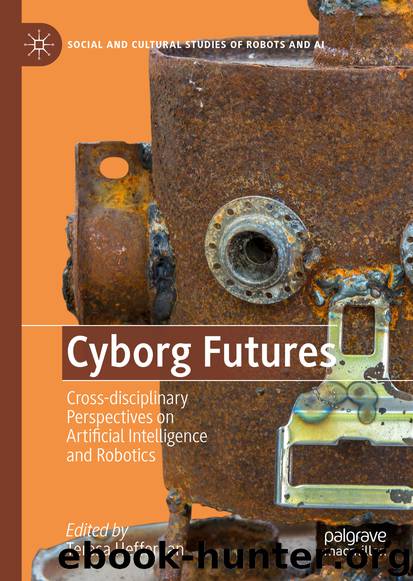Cyborg Futures by Teresa Heffernan

Author:Teresa Heffernan
Language: eng
Format: epub
ISBN: 9783030218362
Publisher: Springer International Publishing
Mind the Gap
The work supporting the material development and implementation of automated robotic systems in actual military and security operations is an instance of what Stiegler calls “noetic” labor. Noetic refers to the ancient Greek noesis—understanding or intellect, from which the English word “nous” derives. There are two related claims that underpin Stiegler’s work on the nature of the work of human intellect that I need to introduce briefly. Firstly, noetic labor is the realization of the potential of the individual intellect that is only possible and always takes place in relation to the intelligence of the collective. The noetic individual thinks, imagines, articulates, and reflects on her experience and her perceptions. She reasons and speculates, drawing on established knowledge in (more or less explicit) dialogue with others. These others differentially comprise various groupings which define and condition her identity understood as process rather than as innate or essential element. Intelligence develops in this process of a mutual, ongoing “individuation” of individual and collective(s).3 As part of this individuation of the I and the we, the “psychic” and “collective” individual, intelligence is never without a social dimension, that is, it is never without an historical, cultural, and political dimension. For Stiegler, human intelligence is something that is formed in the relation between the individual and the social group(s) as individuals multifariously act on, confirm, question, modify, and reestablish the “we’s” collective knowledge of the world.4 This is especially pertinent to and only too clear in considering this military-industrial effort to rethink the nature, value, and conduct of military operations against other “we’s” through a discourse on the potential applicability to these questions of the latest intelligence about artificial intelligence.
Secondly, as what distinguishes ours from the intelligence of other beings, human intelligence amounts to a process that emerges from a reflecting on and sharing of experience that is equally dependent on the accumulated knowledge of the shared experience of the collective’s history. The material substrate of this accumulated knowledge is artifactual, that is, technical. We inherit past insights and understandings from what is left behind from those who lived before. The social, cultural knowledge-banks of the collective are mediated by the material residues of the experiences and discoveries and plans of the past. For Stiegler this puts the specificities and the contingencies of the production and retention of technical forms at the very heart of individual and collective human becoming. What we make and what we preserve depends on these residues and also impacts future access and orientation to them for those thinkers to come. In what follows I hope to explain the relevance of these perspectives on human intelligence in my examination of the strange fruits of this noetic labor expended on advancing military robotics toward a model of a swarming intelligence that is promoted as both more and less than human intelligence.
Stiegler’s thinking about human thinking is influenced by many writers, but his adoption and reformulation of Aristotle’s doctrine of the souls, taken together with the insight he draws
Download
This site does not store any files on its server. We only index and link to content provided by other sites. Please contact the content providers to delete copyright contents if any and email us, we'll remove relevant links or contents immediately.
Whiskies Galore by Ian Buxton(41967)
Introduction to Aircraft Design (Cambridge Aerospace Series) by John P. Fielding(33106)
Small Unmanned Fixed-wing Aircraft Design by Andrew J. Keane Andras Sobester James P. Scanlan & András Sóbester & James P. Scanlan(32779)
Craft Beer for the Homebrewer by Michael Agnew(18218)
Turbulence by E. J. Noyes(8007)
The Complete Stick Figure Physics Tutorials by Allen Sarah(7352)
Kaplan MCAT General Chemistry Review by Kaplan(6916)
The Thirst by Nesbo Jo(6909)
Bad Blood by John Carreyrou(6601)
Modelling of Convective Heat and Mass Transfer in Rotating Flows by Igor V. Shevchuk(6421)
Learning SQL by Alan Beaulieu(6264)
Weapons of Math Destruction by Cathy O'Neil(6248)
Man-made Catastrophes and Risk Information Concealment by Dmitry Chernov & Didier Sornette(5981)
Digital Minimalism by Cal Newport;(5740)
Life 3.0: Being Human in the Age of Artificial Intelligence by Tegmark Max(5534)
iGen by Jean M. Twenge(5398)
Secrets of Antigravity Propulsion: Tesla, UFOs, and Classified Aerospace Technology by Ph.D. Paul A. Laviolette(5358)
Design of Trajectory Optimization Approach for Space Maneuver Vehicle Skip Entry Problems by Runqi Chai & Al Savvaris & Antonios Tsourdos & Senchun Chai(5055)
Pale Blue Dot by Carl Sagan(4984)
